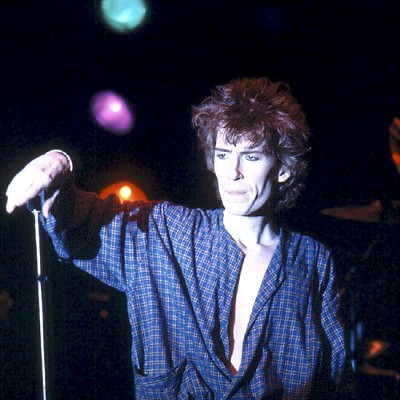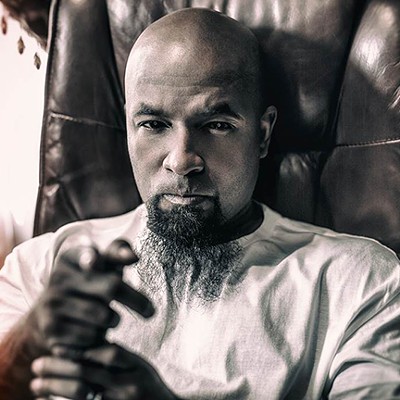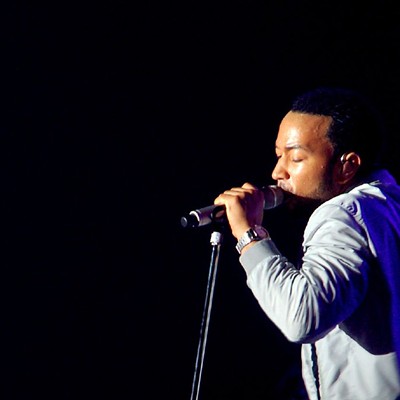With a résumé like that of Nils Lofgren, one that earns you a spot in the Rock and Roll Hall of Fame, it can be hard to know where to begin. The guitarist and songwriter has been embedded in many places throughout classic rock history, including working with Neil Young throughout the '70s, as founder and frontman of Grin, serving as a continuing member of Bruce Springsteen's E Street Band, and even being in the original three incarnations of Ringo Starr & His All-Starr Band, not to mention the time Lofgren co-wrote 13 songs with Lou Reed, some of which appeared on The Bells.
Throughout it all, Lofgren, now 64, maintained a prolific solo career, which he continues to sustain, although now he shies away from record companies. "I saw the writing on the wall—[record companies are] just like everything else, more of a bureaucracy," he says.
I made the trip out to his quiet, gated Scottsdale ranch, which includes an eight-car garage that his wife Amy transformed into Lofgren's personal studio and practice space. At 5'3" and dressed simply in blue jeans, a black tee and trainers, Lofgren is unassuming as he gives a brief tour around his creative space. One of the many highlights are paintings by the legendary Gonzo artist Ralph Steadman, whom Lofgren met on an airplane and asked to illustrate two album covers: Break Away Angel (2001) and Crooked Line (1992).
Lofgren's show in Tucson at the Rialto Theater will mark exactly 47 years on the road. Sifting through that long tome of history, Lofgren reminisces on his near-mythic past--from meeting Hunter S. Thompson to the specter of death surrounding the recording session for Neil Young's Tonight's the Night, to which Lofgren contributed piano. Despite often working solo throughout his career, Lofgren describes himself as more of a band person.
"When my band Grin broke up, it was a hard thing for all of us, but we made four good records, got good reviews and didn't sell. So finally no record deals, I carried on as a solo artist, which was very uncomfortable for a while," Lofgren says. "[When] I did the After the Gold Rush record with Neil Young, I realized it's fun to go to work with a team of great musicians and not be the boss. My only issues are musical. All the politics, the personalities, all that is taken care of by somebody else. So every time I have a chance to play in somebody else's great band, I recognize its going to be a good thing for me and inspiring and healing and when I come back to my own music, I'm refreshed. Right now, I'm recharged after 26 months with the E Street band, which ended a year ago, I've been doing my own shows again, oh yeah, that's how it goes, being the band leader and a singer. And it's fun."
These days, his solo sets are joined by Greg Varlotta on guitar, keyboards and backup vocals, who Lofgren has been working with for a decade. Lofgren also employs tap dancing, of all things, in his live show.
"It's more the percussive musical school of tap dancing as opposed to the show-and-tell of Broadway," Lofgren says. "So we use Greg as a percussion instrument a couple times in the night ... I do it in the show once in a while. At my worst, it's hilarious. At my best, it's a little musical. Greg is brilliant at it."
Tap dancing antics aren't all that Lofgren is known for, as his 1985 solo album Flip was to be taken literally. "I used to do a back flip off a mini trampoline. I played guitar and jumped off PA stacks and drum risers, just having too much fun," Lofgren recalls. But eventually, those decades of aerobics, accumulated with years of playing basketball and other sports, caught up with the musician.
"I destroyed all the cartilage in both hips. There was none left. They were both bone on bone, just rubbing," Lofgren recalls. In 2008, he had double hip replacement surgery, but was back on his feet soon—three months later he played the Super Bowl with Bruce Springsteen and the E Street Band, which led into the Working on a Dream Tour. "I was very lucky the Super Bowl was a twelve-minute performance," Lofgren says. "I would have been hard pressed to do a whole show."
Lofgren describes his life these days as comfortable, but far from complacent—he would never dream of giving up going on the road. Even if he won the lottery, he says, he would still need to perform, recalling the time that Ringo Starr called him up, asking him to join His All-Starr Band.
"In '89, [Starr] called me and he said, 'I'm putting the first band together since the Beatles. I just have to go play,'" Lofgren says. "Even he was making that discovery. Look, I got money, I'm famous, I have a body of work, maybe the best body of recorded music in history, arguably, and something's missing. It was so hilarious and beautiful to hear him on the phone just say, 'you know what I'm a drummer. I need to go play drums' ... It was interesting to see that kind of self-awareness. It was beautiful to help him actualize that self-awareness moment where this is not enough. I need to go be a drummer. So that's always stuck with me."
Last year, Fantasy Records put out Face The Music, a ten-disc boxed set that examined Lofgren's illustrious 45 years of recordings, handpicked by the musician himself. These days, Lofgren is looking to write and record again, including revisiting some songs co-written with Lou Reed that weren't released.
"I really feel blessed that we have some songs that haven't seen the light of day that we wrote together that I'm going to try to dust off," he says. "I don't know what the record will be. I'll just see what comes up.".







